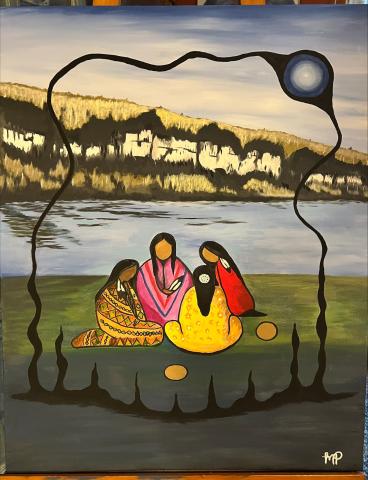The integration of First Nations perspectives can foster a more comprehensive and effective response to climate change.

I am from the Chippewas of Nawash First Nation on the Saugeen (Bruce) Peninsula. My traditional territory is shared with the Saugeen First Nation and together we form the Saugeen Ojibway Nation (SON). Our Territory continues to see many impacts on our way of life. Examples of these include the world’s largest operating nuclear facility; the world’s largest salt mine; Ontario’s third largest National Park; plans to build a Deep Geological Repository and a Hydroelectric pumped storage facility; and numerous quarry excavations due to the high quality dolomitic limestone in the area.
First Nations perspectives on climate change are deeply rooted in our traditional knowledge, cultural values, and spiritual connections to the land. These perspectives emphasize a holistic understanding of the environment, where the earth, water, plants, animals, and humans are interconnected and interdependent. Unlike the Western paradigm, which often views nature as a resource to be exploited, First Nations peoples see ourselves as stewards of the land, responsible for maintaining its health for future generations.
Climate change, from a First Nations viewpoint, is not merely a scientific or environmental issue but also a cultural and existential threat. Many First Nations communities rely on traditional practices such as fishing, hunting, and farming, which are being disrupted by changing weather patterns, shifting ecosystems, and the loss of biodiversity. All of the examples of “development” given above have profound implications for our communities, affecting our hunting and gathering practices and, consequently, our food security and cultural traditions.
Moreover, our people recognize the impacts of climate change on their mental and spiritual well-being. The degradation of sacred sites and the loss of species integral to their cultural heritage can lead to a sense of grief and disconnection. This underscores the need for climate policies that incorporate Indigenous knowledge and values, respecting their unique insights into ecosystem management and sustainability.
First Nations worldwide are advocating for a more inclusive approach to climate action, one that honors treaties and Indigenous rights while promoting environmental justice. We call for the protection of traditional lands and waters, increased support for community-led conservation projects, and greater involvement in decision-making processes.
However, it is crucial to recognize that Indigenous communities are often marginalized and our knowledge overlooked. The historical injustices we have faced, including land dispossession, cultural erasure, and systemic discrimination, continue to impede our ability to influence global environmental policy. To truly address climate change, we must prioritize Indigenous voices, honor their sovereignty, and support their leadership in environmental conservation.
By integrating First Nations perspectives, we can foster a more comprehensive and effective response to climate change, one that respects both the natural world and the cultural heritage of Indigenous peoples. This approach not only addresses the immediate impacts of climate change but also works towards a more equitable and sustainable future for all. To learn more about what my community is doing visit our Environmental website.
Miigwetch!
— Martha Pedoniquotte, Indigenous Ministries and Justice, Community Capacity Development Coordinator.
The views contained within these blogs are personal and do not necessarily reflect those of The United Church of Canada.